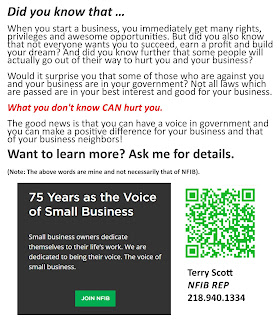H.R. 2513 Is not good for Small Business, says Ter Scott.
Here are the details about this bill, courtesy of NFIB.com/beneficialownership. Please read this and forward this information on to other business owners who share your concerns. And, if you are not yet a member of NFIB, please consider joining your neighboring businesses who have come together to hold their legislators accountable. Contact me, Ter Scott, an NFIB membership rep to discuss what NFIB is about and how you can join the 76-year movement!
H.R. 2513, the Corporate Transparency
Act of 2019, would require nearly every small business with fewer than 20 employees to
file new reports with the Treasury Department’s Financial Crimes
Enforcement Network (FinCEN), which include:
·
Existing businesses
within 2 years of enactment
·
New businesses at
incorporation
·
Every business
annually
The legislation requires the Treasury Department to keep the beneficial ownership
information (which includes the names, dates of birth, addresses, and driver’s
license numbers or passport numbers of anyone with an ownership stake in the
business) in a federal database for the life of the business plus five years and grants
broad access to the information to federal, state, local, or tribal law
enforcement agencies for virtually any reason through a simple request.
The potential for improper disclosure or misuse of private information
increases as the number of people with access to the information increases.
Failure to comply with
this legislation would be a federal crime with civil penalties of up to $10,000
and criminal penalties of up to 3 years in prison.
Take Action
NFIB’s Position
·
NFIB opposes the Corporate
Transparency Act. In a recent NFIB Member Ballot, 80 percent of
small business owners opposed Congress requiring small business owners to file
paperwork with the Department of Treasury each time they form or change
ownership of their businesses.
·
NFIB members rank
federal paperwork as the 12th biggest problem, out of 75
issues, they encounter as small business owners.
·
Small businesses often
file paperwork themselves. Just over half of small business owners personally
handle the business’s financial paperwork and record-keeping, and 15 percent of
owners delegate those responsibilities to an employee. Time and money spent
filing paperwork with the federal government detract from growing their
businesses and creating jobs.
·
There are 5,305,960
small businesses with fewer than 20 employees. The owners of millions of small
businesses across the United States do not have time or resources for new
reporting requirements.
Learn how Minimum Wage Hike, Predictive Scheduling, Transparency Law
will affect your business and how you can stop it! Contact Ter Scott to join NFIB today.




Comments
Post a Comment